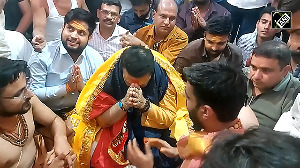 Going strong on its green run, the railways have decided to replace the electrical multiple units (EMUs) it uses to operate 2,415 trains in Central Railway and Western Railway zones with those running on three-phase Insulated Gate Bi-polar Transistor (IGBT) technology, reports Sharmistha Mukherjee.
Going strong on its green run, the railways have decided to replace the electrical multiple units (EMUs) it uses to operate 2,415 trains in Central Railway and Western Railway zones with those running on three-phase Insulated Gate Bi-polar Transistor (IGBT) technology, reports Sharmistha Mukherjee.
The move will save the railways Rs 200 crore (Rs 2 billion) annually on energy expenses.
Although these advanced rakes cost almost twice as much as normal EMU ones, railway ministry officials believe these trains will be more profitable in the long run.
The IGBT technology will help us save up to 30 per cent of the energy required to run a train by converting the kinetic energy that is lost in braking into reusable electrical energy.
This amounts to the railways saving around 5,366 units of electricity per day per rake, a highly-placed official in the ministry explained.
While an AC/DC traction consumes 30.25 units of electricity/1,000 gross tonne kilometre (gross tonne kilometre is the product of the weight of the train and the distance it travels), a rake with the IGBT-based propulsion system requires only 17.73 units/1,000 gross tonne kilometre. Over a year, this converts into Rs 1 crore (Rs 10 million) saving per rake, said another official.
Apart from being energy-efficient, these rakes are equipped with passenger information and improved ventilation systems for enhanced comfort. They are also capable of greater acceleration.
These come for a price, though. A 12-car rake with the advanced system is priced at Rs 28 crore (Rs 280 million). The normal EMU rake, on the other hand, costs around Rs 16 crore (Rs 160 million). Siemens has been entrusted with supplying the railways IGBT-based propulsion systems at a cost of Rs 14 crore (Rs 140 million) per system.
At present, the technology is being used to operate 47 rakes in Central Railway and Western Railway zones. These run 680 services daily. The official referred to initially told Business Standard, The railways will commission another 48 rakes with regenerative braking system in Central and Western Railways during 2009-10. Eventually, a total of 200 rakes will be inducted.
At first, all 2,415 trains on Central and Western Railways were to be operated on IGBT technology by March 2010. However, the deadline has been revised to March 2012. Congestion on these routes is making it difficult to replaces the coaches, said ministry sources.
Plans have also been chalked out to introduce the new technology in Delhi, Kolkata and Chennai. Depending on the demand due to growth in traffic and from replacement in aged rakes, 50 IGBT-based rakes will be distributed amongst these metros in the first phase, said an official.
Eventually, the railways will look at running the 4,680 services and 431 services it operates using EMUs and MEMUs, respectively, with this technology.







 © 2025
© 2025